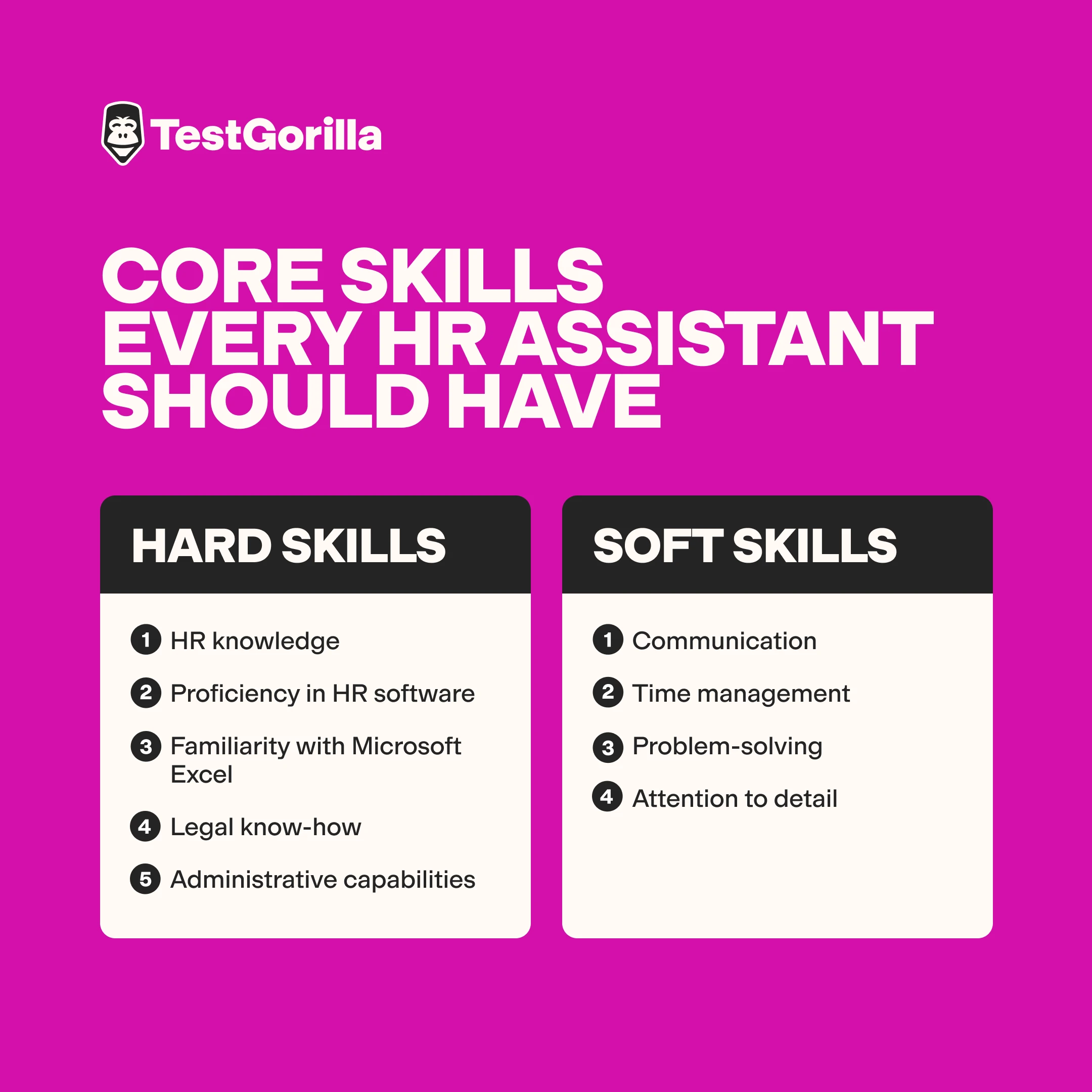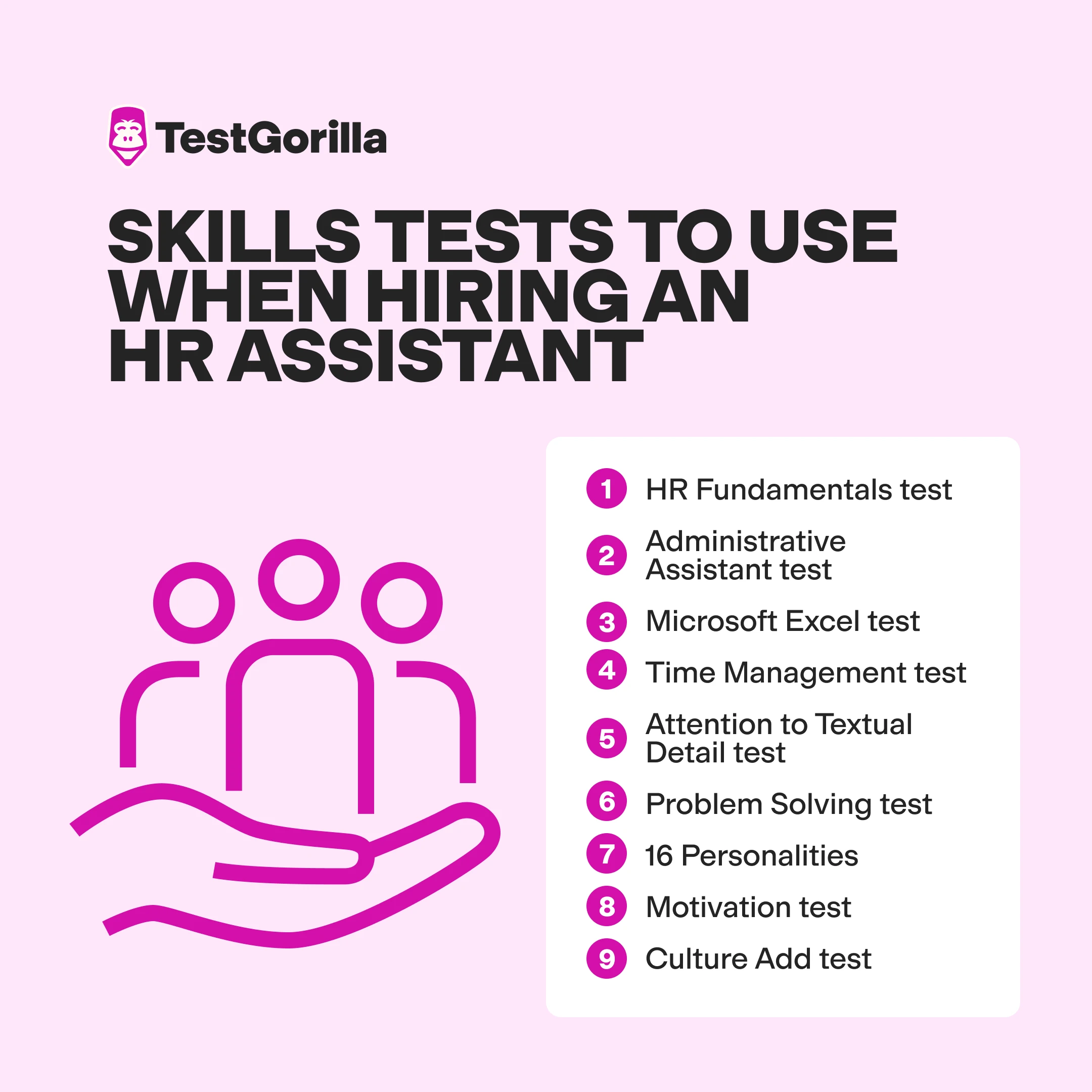HR assistants are the backbone of any HR department, tackling everything from scheduling meetings and organizing paperwork to producing important reports for senior leaders. It’s a high-stakes job but, unfortunately, one that’s tricky to hire for.
Companies often treat the hiring process for this job like any other administrative assistant role without considering the specific skills needed for HR work. This can lead to major problems, including a chaotic HR team, unhappy employees, and even legal troubles.
Luckily, we’re here to help you avoid these challenges. In this guide, we’ll explore 9 essential skills for HR assistants and show you how to assess them so you can make the best choice for your team.
What is an HR assistant?
An HR assistant provides administrative support to members of the HR department and makes sure everything runs smoothly for the HR team and the company’s employees.
Day-to-day, HR assistants tackle a wide range of tasks. They manage calendars, update employee records, and answer questions about HR policies and benefits. They also help organize training sessions, manage payroll data, and create reports that senior HR managers need for decision-making.
HR assistants work with pretty much everyone in the company. They support HR team members in their initiatives and also address employees’ needs and concerns.
Core skills every HR assistant should have
The best HR assistants will have the below hard and soft skills under their belts.
Hard skills
HR knowledge: Top HR assistants know the ins and outs of human resources and your company’s specific HR policies so they can answer queries about anything from hiring to firing.
Proficiency in HR software: HR is no longer the old-school, manual department it once was. Today’s HR assistants should be tech-savvy and well-versed in using HR information systems (HRIS) and HR management systems (HRMS) to manage their daily tasks digitally.
Familiarity with Microsoft Excel: The best candidates will be comfortable using Microsoft Excel (or Google Sheets) to store and sort staff data, pull up reports such as attendance records, and more. This way, they can keep information neatly organized and provide HR leaders with whatever they need quickly and easily.
Legal know-how: Knowing labor laws isn’t just helpful. It’s a must if you want to keep your company out of legal hot water. That’s why your HR assistant candidate must know labor laws like the back of their hand and help the larger team stick to the rules.
Administrative capabilities: HR assistants wear many hats, organizing paperwork, scheduling interviews, planning events, etc. The best candidates should easily manage all these tasks without missing a beat.
Soft skills
Communication: HR assistants need to communicate clearly to make sure everyone’s on the same page and avoid misunderstandings about policies, team updates, scheduling, or other HR tasks.
Time management: Given the level of multitasking needed, it’s key that candidates can prioritize their tasks, meet deadlines, and deal with unexpected requests that pop up out of nowhere.
Problem-solving: Whether it’s dealing with scheduling conflicts, payroll errors, or other challenges, a great HR assistant can think on their feet and quickly solve issues big or small.
Attention to detail: Dotting the i’s and crossing the t’s makes all the difference when handling important and sensitive data like payroll reports. HR assistants should be able to work meticulously and catch small mistakes before they become big problems.
The best insights on HR and recruitment, delivered to your inbox.
Biweekly updates. No spam. Unsubscribe any time.
How to assess HR assistant candidates
Knowing which skills to look for can help you write a solid job description for your HR assistant role and attract the right people. But, you still need to thoroughly assess your applicants before hiring them. That’s where TestGorilla’s talent assessment can help.
Our online tests let you check your candidates’ hard and soft skills, personality traits, and more so you can get a full picture of their strengths and weaknesses. Explore our library of 400+ tests and pick up to five to create a multi-measure assessment for your HR assistant position.
Here's what we recommend when assessing HR assistant candidates:
Assess the hard skills
First, use these tests to measure candidates’ hard skills and HR knowledge:
The HR Fundamentals test is an all-in-one test that checks for HR expertise, relationship management skills, and the ability to solve everyday HR issues – so you can hire someone who can ace the job.
TestGorilla’s Administrative Assistant test measures whether candidates can handle logistical tasks, coordinate projects, and support HR managers in their daily duties.
Our Microsoft Excel (general) test will tell you how skilled your candidates are in using Excel for basic tasks such as organizing info, managing budgets, and running reports.
Still not sure why your HR assistant needs to know Excel? Read our blog post about Excel competency tests for admin assistants to learn why these skills are essential.
Test these soft skills and traits
Next, vet your candidates’ soft skills to see if they’re good communicators, multitaskers, and proactive problem-solvers. Our tests below are perfect for this.
TestGorilla’s Time Management test shows you if someone can plan, prioritize, and complete their tasks on time. This is especially important for HR assistants who manage not only their own time but also their team members’ time.
Our Attention to Detail (textual) test is an excellent way to check if your applicants have a keen eye for detail and can easily spot and fix errors in information.
The Problem Solving test helps you see if individuals correctly define problems, proactively think about solutions, and act on them before they get out of hand.
Check for personality fit and culture add
Finally, you should make sure your chosen candidate fits in with the broader team, gels with your working practices, and adds to the company’s culture. Here are some TestGorilla assessments that measure these qualities:
TestGorilla’s 16 Personalities, Enneagram, DISC, and other personality tests help you to really get to know the person behind the application so you can make informed hiring decisions. What are they like? What makes them tick? What are their strengths and weaknesses?
Our Motivation test has you and your candidates fill out a customized survey separately, then compares the results to check how closely applicants’ expectations align with your job offer. This way, there are no nasty surprises after they join.
The Culture Add test is one we can’t recommend enough. It works similarly to our Motivation test. You complete a short survey ranking the values important to your company. Candidates then fill out the same questionnaire, and you can see whose answers align best with yours. This ensures you hire someone who not only fits in with but also contributes to your culture every day.
Go further with behavioral interviews
Once you’ve shortlisted your top candidates, you can use behavioral interviews to dig deeper into their experiences, working styles, attributes, and more.
We recommend using structured interviews where you ask every candidate the same questions, making the process fair and easy to compare.
For your HR assistant candidates, consider including questions like these:
Recall a time when you were under a lot of pressure at work. How did you manage your workload, and what was the result?
This question tests candidates’ ability to manage stress and prioritize their tasks. It can also show how they deal with things when their workload gets out of hand.
Tell me about a time when you made a mistake at work. How did you handle it, and what did you learn from that experience?
As American author Rita Mae Brown once said, “Good judgment comes from experience, and experience comes from bad judgment.” With a question like this, you’ll learn more about a candidate’s sense of accountability, honesty, and ability to learn from mistakes.
Describe a project that you managed from start to finish. What challenges did you face, and what was the outcome?
This question is a great way to dive into your applicants’ task and project management skills. You also learn how well they can define and face unexpected challenges.
Looking for more questions? Check out our blog post with 40 HR assistant interview questions.
3 mistakes to avoid when assessing HR assistant candidates
As you evaluate your HR assistant candidates, dodge these common pitfalls:
1. Focusing too much on years of experience
When hiring an HR assistant, it’s tempting to lean heavily on a candidate’s past HR experiences. But here’s the thing: Just because someone has been around the block doesn’t mean they’re the perfect fit for your needs.
Imagine hiring someone who has decades of experience in large companies but struggles to work in a fast-paced startup culture.
Rather than just ticking boxes for years of experience, dig into how their skills and qualities align with your company and ask them how they’d handle situations they’re likely to face with you.
2. Forgetting to assess adaptability
HR can be pretty unpredictable. Policies change, employees come and go, and new challenges pop up all the time. If your HR assistant can’t pivot when needed, you might find your HR department stuck in the mud, struggling to keep pace.
Throw some curveball scenarios at candidates during their interviews. See how they’d handle a sudden change in company policy or a last-minute project. This isn’t just about thinking on their feet – it’s about thriving in the ever-changing world of HR.
3. Not assessing proficiency in your specific HR software
It’s one thing to hire tech-savvy candidates. But you also need to make sure they’re already familiar with the specific tools your company uses.
For instance, someone could be skilled in Excel, but if they can’t use your Oracle software, it could take a while for them to learn it.
A slower-paced environment might allow time for this kind of training. But if you’re looking to move quickly, task candidates with using your chosen app to enter sample data, pull reports, etc., so you can ensure they’re ready to roll from day one.
FAQs
Want to know more about HR assistants? Check out our answers to these frequently asked questions.
Is an HR assistant job stressful?
Like all other jobs, the HR assistant job can be stressful at times. For instance, it might be busy during recruitment drives or employee evaluations. But good employers will make sure HR assistants get downtime and enough paid time off to prevent burnout.
What’s the difference between an HR assistant and an HR generalist?
An HR assistant focuses on clerical tasks, such as scheduling interviews and updating records. An HR generalist, on the other hand, handles a broader scope, such as dealing with employee relations, creating policies, and making important decisions.
It’s not uncommon for HR assistants to become HR generalists once they’ve gained the relevant skills.
How much do HR assistants get paid?
The salary for HR assistants differs based on location, experience, and company size. According to Glassdoor, HR assistants in the US earn about $46,999 per year on average.
Hire the best HR assistants with TestGorilla
The perfect HR assistant does more than just paperwork. They’re a pillar of support for your HR department, juggling multiple tasks, all while maintaining a positive rapport with employees.
The best candidate will be knowledgeable in HR and labor laws, good at communicating and solving problems, and familiar with HR tools and technologies. But spotting this talent means looking beyond resumes and really seeing candidates’ skills in action.
TestGorilla’s talent assessments let you test your candidates’ hard and soft skills, personality traits, cultural contributions, and more so you can choose the best HR assistant for your company.
Get started by checking out our selection of tests or creating a free account today!
You've scrolled this far
Why not try TestGorilla for free, and see what happens when you put skills first.
















